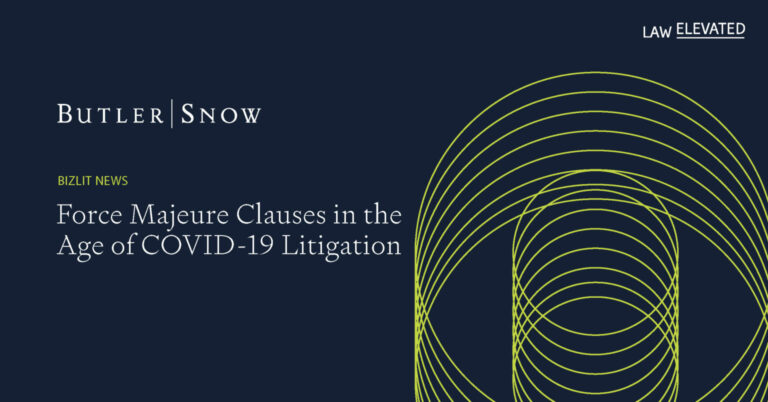Force majeure, once a standard boilerplate clause included in most contracts without thought, has now become the site of an emerging litigious battleground. As we enter the third year of the COVID-19 pandemic, a reliable amount of case law has developed addressing whether a party’s failure to perform as a result of a COVID-related issue can be classified as a force majeure event warranting the excusal of a contractual obligation.
Prior to 2020, courts generally considered two factors in deciding whether excusing performance was appropriate: the language of the force majeure clause, and the facts surrounding the specific dispute. Allegiance Hillview, L.P. v. Range Tex. Prod., LLC, 347 S.W.3d 855, 865 (Tex. App.—Fort Worth 2011, no pet.) (discussing the court’s role in construing contracts with respect to the particular business activity sought to be served).
Two years later, however, courts have developed a more predictable framework for evaluating whether the failure to perform based on COVID-19 related restrictions constitutes a force majeure event that excuses performance.
Most notably, courts will look to whether a force majeure provision lists a pandemic as a force majeure event. For most pre-2020 contracts, this requires the analysis of frequently used “catch-all” provisions. Because most catch-all provisions lack specificity, courts have been guided primarily by the specific impact of the pandemic, and a parties’ actions (or inaction) during the pandemic.
In Nelkin v. Wedding Barn at Lakota’s Farm, LLC, a couple sought a refund from a wedding venue following the governor’s May 2020 executive order banning large gatherings. 72 Misc. 3d 1086, 152 N.Y.S.3d 216 (N.Y. Civ. Ct. 2020). The couple sought a refund pursuant to a force majeure provision in their contract, which the venue subsequently refused to honor. Id. The court ultimately ruled in the couple’s favor, emphasizing that the contract’s force majeure provision specifically included “government regulations” and “disasters.” Id.; see also Lampo Grp., LLC v. Marriott Hotel Servs., Inc., No. 3:20-CV-00641, 2021 WL 3490063 (M.D. Tenn. Aug. 9, 2021) (finding that under the canon of ejusdem generis a pandemic can be included in a list containing “acts of God, war, acts of domestic terrorism, or strikes”).
Conversely, courts have held that COVID-19 is not a free license to evade contractual performance. In STORE SPE LA Fitness v. Fitness Int’l, LLC, the plaintiffs moved for summary judgment after the defendants’ failure to make rent payments owed under their commercial lease. No. SACV20953JVSADSX, 2021 WL 3285036 (C.D. Cal. June 30, 2021). Defendants argued that the force majeure provision in their lease excused them from any obligation to pay rent during California’s government-mandated closure of its facilities. Id. The court ultimately held that because the defendants failed to show that the government closures were the root cause of their inability to pay rent, the force majeure provision was not triggered. Id; see also In re CEC Ent., Inc., 625 B.R. 344 (Bankr. S.D. Tex. 2020) (force majeure clause not triggered where clause precluded excusal of rent payments due to a global pandemic or government restrictions).
Practical Considerations
As the COVID-19 pandemic evolves into an ever-present endemic, there is no question that parties will continue to make force majeure arguments. However, in the age of COVID-19, parties responding to force majeure arguments are more likely to assert that the party seeking excusal was not impacted by the event in such a manner that would excuse them of performance. Given the trends and creative solutions birthed by the sheer duration of the COVID-19 pandemic, courts may increasingly find even the limited ability to perform grounds to bar a pandemic-related force majeure argument.
Parties should consider whether the impact of an event truly prohibits their performance before seeking excusal from a contractual obligation, particularly in pre-2020 agreements. Going forward, when drafting force majeure clauses, parties may need to decide whether a catch-all provision would be effective in the advent of an unforeseen calamity. Additionally, when necessary, parties may need to enumerate the types of events a force majeure clause should include, as well as the specific types of events the clause is not intended to excuse.
